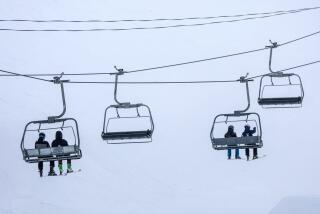Rangers Bring All-Terrain Security to Utah Olympics
- Share via
PARK CITY, Utah — How do you defend an entire mountain range?
With venues spread over a 6,000-square-mile area and events conducted on 10,000-foot peaks, guarding the Winter Games has been a monumental challenge.
Security officials here solved that puzzle by reaching deep into the government’s storehouse of resources and culled experts from 13 federal agencies. Among the 10,000 security personnel are National Park Service rangers patrolling the rugged mountains on skis and Bureau of Land Management agents cruising the back country on snowmobiles.
The Park Service rangers include four from Yosemite National Park, skiing Park City’s massive mountain in their yellow and black parkas with “police” printed on the back in reflective letters.
“We are prepared to go out on all terrains, in all conditions, at all hours,” said Maura Longden, a district ranger at Yosemite, describing her Olympic job responsibilities.
“We are all here because we are comfortable in this environment; this is the office we work in every day,” Longden said, gesturing at the imposing peaks and rocky escarpments towering above her.
“We rely on our skills and experience in these conditions. We know how to conduct ourselves, how to stay safe and how to handle the extremes in weather.
“Since we are mobile, we can get from Point A to Point B faster than anybody.”
The rangers’ experience working in the snow allows them to scan a white-faced mountain and see objects or people others might not.
“Because of where we work, we understand snow,” ranger Nate Inouye said. “There are thousands of kinds of snow that we are able to look at and tell its tensile strength, if it’s packed or safe. Somebody working in an urban environment, sitting behind a desk, just wouldn’t be able to do what we do.”
Longden, Inouye, Greg Lawler and Dave Hajdik are experts in cross-country and alpine skiing, search and rescue, first aid and wilderness survival. Longden, for example, is one of two Yosemite rangers who winter in the park’s back country, fending for themselves for seven snowbound months a year.
The Secret Service, which is coordinating Olympic security, would not allow the rangers to speak specifically about their duties, but they have security and safety chores at the snowboarding and alpine venues.
All four are certified as federal law enforcement officers, and they carry weapons during their shifts. Security is round-the-clock.
“Our shift begins with a briefing in which we all share information,” Longden said. On any given day they might be called upon to search the mountain for places where people or devices might be hidden, test for avalanche dangers or assess the best trails for other security personnel to take.
Longden said they arrived before the Games and trained on the mountain to familiarize themselves with the setting.
When on patrol they carry heavily laden backpacks with extra layers of warm clothing, gallons of water and food, avalanche safety equipment and global positioning systems. Sometimes the rangers are on cross-country skis and other times they are on downhill skis, depending on their assignment.
“We carry enough equipment to be out well beyond our shift,” Lawler said, guessing they heft 25 or 30 pounds on their backs.
This marks the first time the Games’ security has been under the jurisdiction of the Secret Service. A massive force of local, state and federal security workers are here, in addition to military and National Guard personnel.
“Without all of us working together, we couldn’t have accomplished this,” said David Tubbs, director of the Utah Olympic Public Safety Command. “The fact that we have all these people with specialized skills--skiing and snowshoeing, in some cases--that sets this apart. We have made certain that people were placed in a position where they could do us some good.”
The rangers, handpicked for this assignment, say they have been surprised by the reactions of spectators.
“I’m so pleased that people come up to us and thank us for being here,” Lawler said. “They see our Park Service patch and ask what we’re doing. It’s really an honor to be here. Plus, any day spent on skis is a good day.”
More to Read
Go beyond the scoreboard
Get the latest on L.A.'s teams in the daily Sports Report newsletter.
You may occasionally receive promotional content from the Los Angeles Times.







